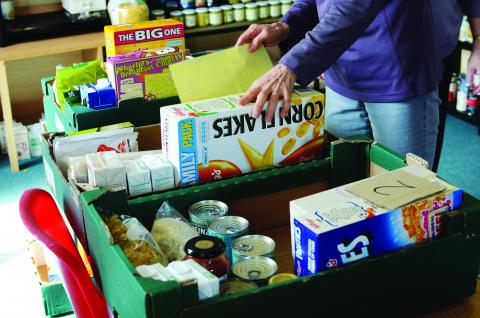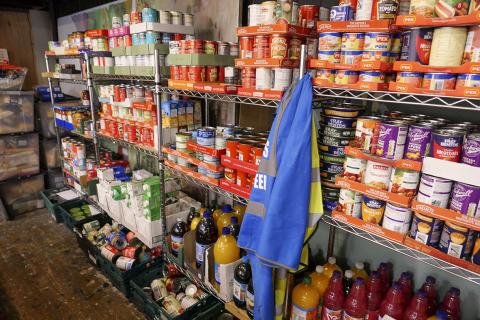Child food insecurity doubles fueling calls for urgent expansion of Free School Meals
by Shona Goudie
Child food insecurity levels have doubled in the past year
A new survey from The Food Foundation’s Food Insecurity Tracker has found that the number of households where children are experiencing food insecurity has nearly doubled in the past year, demonstrating the need for urgent policy action to ensure children can access the food they need. In January 2023, 21.6% of households with children reported that their children had directly experienced food insecurity in the past month, affecting an estimated 3.7 million children. This is compared with 11.6% in January 2022.
The cost of living crisis is causing significant worry for parents in food insecure households
The cost of living crisis is having a devastating impact on children across the country, particularly those in low income households and those at risk of food insecurity. This affects every aspect of their life from education, to their friendships and social development, to their physical and mental health, robbing them of their childhood. For example, in households with children who had experienced food insecurity in the past month, 78% reported being worried about the impact of being unable to afford sufficient food on their children's physical health and 76% on their mental health. No child should have their health, well-being and prospects jeopardised due to poverty and circumstances outwith their control.
There is strong public support for Government to take action to help children be able to eat well
A national MRP poll, also published today by The Food Foundation, shows overwhelming support for the expansion of Free School Meals. Eight out of ten people in England (80%) now support calls for Government to expand the provision of Free School Meals to all children in households receiving Universal Credit. Currently, there are approximately 800,000 children in England who do not qualify for Free School Meals despite living in poverty. Expanding to all those on Universal Credit would be an effective and targeted way of ensuring these children do not miss out on a hot, nutritious meal at school. Support for the policy is high in a raft of key marginal seats at risk of being lost by the Conservative Government in the next election, and in constituencies held by the Prime Minister and his most senior cabinet ministers.
If your local school or area are doing anything additional to expand Free School Meals, we'd love to hear about it and add it to the map. Please email: shona.goudie@foodfoundation.org.uk
Whether children receive a hot, nutritious meal at school should not be a postcode lottery
Currently, children in England are subjected to the strictest eligibility criteria for FSMs out of all the devolved nations in the UK. This results in children in England being unfairly left behind because the UK Government is failing to take the issue of children’s food insecurity as seriously as the devolved Governments. Northern Ireland’s income threshold for eligibility for FSMs is almost twice as high as in England (£14,000 annual earnings compared with £7,400 in England), and they are exploring options for expanding this further. Scotland and Wales are both in the process of rolling out FSMs to all children in primary school regardless of income.
Last week the Labour Mayor of London, Sadiq Khan, announced that he too will be expanding Free School Meals to all children in primary school in London as a one year emergency measure. While this is a very welcome announcement, it is a move that further increases regional inequalities in England. The London initiative puts even greater pressure on national Government to honour its levelling up commitment and eradicate the postcode lottery of access to Free School Meals across the country.
Write to your MP!
All these findings make a powerful case to national Government to act to ensure all children in need can access a Free School Meal. Show your support by emailing your MP - we've drafted a message you can send quickly and easily here. The more politicians hear from the people they represent, the more likely they are to act to #FeedtheFuture.
The Food Foundation has been conducting nationally representative surveys since the start of the pandemic to track levels of food insecurity and identify subgroups of the population who are higher risk. For all our findings, see our Food Insecurity Tracker.
Further information
YouGov survey
We ask the following questions to explore how many children are directly affected by food insecurity. If the respondent answers yes to any of these four questions, it is classified as child food insecurity.
1. We have relied on only a few kinds of low-cost food to feed the child(ren) because we have run out of food and have been unable to get more
2. The child(ren) have not had balanced meals because we have run out of food and have been unable to get more
3. The child(ren) have not eaten enough because we have run out of food and have been unable to get more
4. The child(ren) have skipped meals because we have run out of food and have been unable to get more?
The questions are based on the United States Department of Agriculture's Food Security Survey module. The survey was conducted by YouGov and commissioned by The Food Foundation. The total sample size was 10,814 UK adults. Fieldwork was undertaken between 31st January and 3rd February 2023. The survey was carried out online. The figures have been weighted and are representative of all UK adults 18+. The figures presented from the online survey have been analysed independently by The Food Foundation and the London School of Hygiene & Tropical Medicine. Comparison to older figures is from a series of previous surveys conducted with YouGov commissioned by the Food Foundation. Population calculations are made by the Food Foundation using 2021 mid-year population estimates (ONS).
Focaldata MRP survey
Focaldata specialises in mapping opinion poll data onto smaller geographic areas, using a technique known as MRP, or Multilevel Regression with Post-stratification. This study used data collected from 8,011 respondents between 27th and 30th January 2023 using Focaldata's online platform, which plugs into a global network of panels and uses machine learning to automatically detect and screen out inconsistent and disengaged respondents. While the sample is not large enough to treat the data as separate constituency polls, we can use MRP to look for patterns in responses across constituencies that have similar characteristics, and then work out the implications of those patterns for each constituency.






